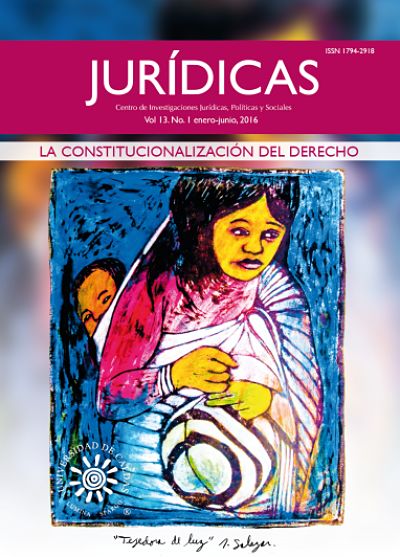Authors
Abstract
In this paper the authors analyze the impact of the precedent judicial extensions system in the implementation of the doctrine of precedent implementation in Colombian administrative law. Also the paper make a balance of the system according to the legislative system propose. In this sense, the first part of the paper shows the theoretical groundings of the doctrine of precedent and explain the different ways that can be used for the legal system to implement this doctrine. In the second part of this work, the authors display the forms by which the Colombian administrative law implemented the precedent judicial extensions system and show some of the causes of the system inefficacy.
References
Alexander, L. (2012). Precedential Constraint, Its Scope and Strength: A Brief Survey of the Possibilities and Their Merits. En Bustamante, T. and Bernal Pulido, C. (Ed.). On the Philosophy of Precedent (pp. 75-82). Stuttgart, Germany: Franz Steiner Verlag.
Alexander, L. and Sherwin, E. (2008). Demystifying Legal Reasoning. Cambridge, England: Cambridge University Press.
Bankowski, Z. et al. (1997). Rationales for Precedent. En MacComrmick, N., Summers, R. and Goodhart, A. (Ed.). Interpreting Precedents (pp. 481-501). New York, USA: Routledge.
Bernal Pulido, C. (2008). El precedente en Colombia. Revista Derecho del Estado, 21, 81-94.
Cepeda, M. (1998). La Corte Constitucional, el año de la consolidación. Bogotá, Colombia: Siglo del Hombre editores.
Chiassoni, P. (2012). The Philosophy of Precedent: Conceptual Analysis and Rational Reconstruction. En Bustamante, T. and Bernal Pulido, C. (Ed.). On the Philosophy of Precedent (pp. 13-33). Stuttgart, Germany: Franz Steiner Verlag.
Cross, R. y Harris, J. (2012). El precedente en el derecho Inglés. Madrid, España: Marcial Pons.
Díaz Revorio, F. (2001). Las sentencias interpretativas del tribunal constitucional. Valladolid, España: Lex Nova.
Dworkin, R. (1977). Taking Rights Seriously. Cambridge, England: Harvard University Press.
Dworkin, R. (1986). Law’s Empire. Massachusetts, USA: Harvard University Press.
Finnis, J. (2000). Ley natural y derechos naturales. Buenos Aires, Argentina: Abeledo Perrot.
Gascón, M. (2012). Rationality and (Self) Precedent: Brief Considerations Concerning the Grounding and Implications of the Rule of Self Precedent. En Bustamante, T. and Bernal Pulido, C. (Ed.). On the Philosophy of Precedent (pp. 35-50). Stuttgart, Germany: Franz Steiner Verlag.
Hart, H.L.A. (1994). The concept of law. Oxford, England: Clarendon Press.
Levenbook, B. (2000). The Meaning of a Precedent. Legal Theory, 6, 185-240.
López, D. (2000). Eslabones del derecho. Bogotá, Colombia: LEGIS.
López, D. (2006). El derecho de los jueces. Bogotá, Colombia: LEGIS.
MacComrmick, N., Summers, R. and Goodhart, A. (Ed.). (1997). Apendix. Interpreting Precedents (pp. 559-561). New York, USA: Routledge.
Merryman, J. (1989). La tradición jurídica romano-canónica. Ciudad de México, México: Fondo de Cultura Económica.
Navarro, P. and Rodríguez, J. (2014). Deontic Logic and Legal Systems. Cambridge, England: Cambridge University Press.
Olano García, H. (2004). Tipología de nuestras sentencias constitucionales. Vniversitas, 108, 571-602.
Rojas Betancur, D. (2012). Extensión de las sentencias de unificación de jurisprudencia. En Consejo de Estado. Instituciones del Derecho Administrativo en el nuevo Código. Una mirada a la luz de la Ley 1437 de 2011. Bogotá, Colombia: Consejo de Estado y Banco de la República.
Vargas Rozo, O. (2014). Las sentencias de unificación y el mecanismo de extensión de la jurisprudencia. Bogotá, Colombia: Sala de Consulta y Servicio Civil del Consejo de Estado y Ministerio de Justicia y del Derecho.
Schauer, F. (2004). Las reglas en juego. Un examen filosófico de la toma de decisiones basada en reglas en el derecho y en la vida cotidiana. Barcelona, España: Marcial Pons.
Troper, M. and Grezegorczyk, C. (1997). Precendent in France. En MacComrmick, N., Summers, R. and Goodhart, A. (Ed.). Interpreting Precedents. New York, USA: Routledge.
Raz, J. (1990). Practical Reason and Norms. Oxford, England: Oxford University Press.

 PDF (Español)
PDF (Español)
 FLIP
FLIP


























